…and Pope Francis refuses his request. What does it all mean?
Cardinal Reinhard Marx, 67, Archbishop of Munich and Freising in Germany, sent shockwaves through the Catholic world when his letter to Pope Francis, dated May 21, asking the Pope to accept his resignation as Archbishop, was made public June 4. Pope Francis replied with his own letter, dated May 21 but published June 10, asking Cardinal Mark to “continue” in his episcopal post. The German prelate is a former president of the German Bishops’ Conference and a confidant of Pope Francis who has been a member of his Council of Cardinal Advisers since April of 2013, just a month after Francis’ election, and is a coordinator of the Pope’s Council for the Economy. He is also a supporter of the Catholic Church in Germany’s proposed “Synodal Path,” about which it has been repeatedly warned by the Vatican for apparently treading too close to schism.
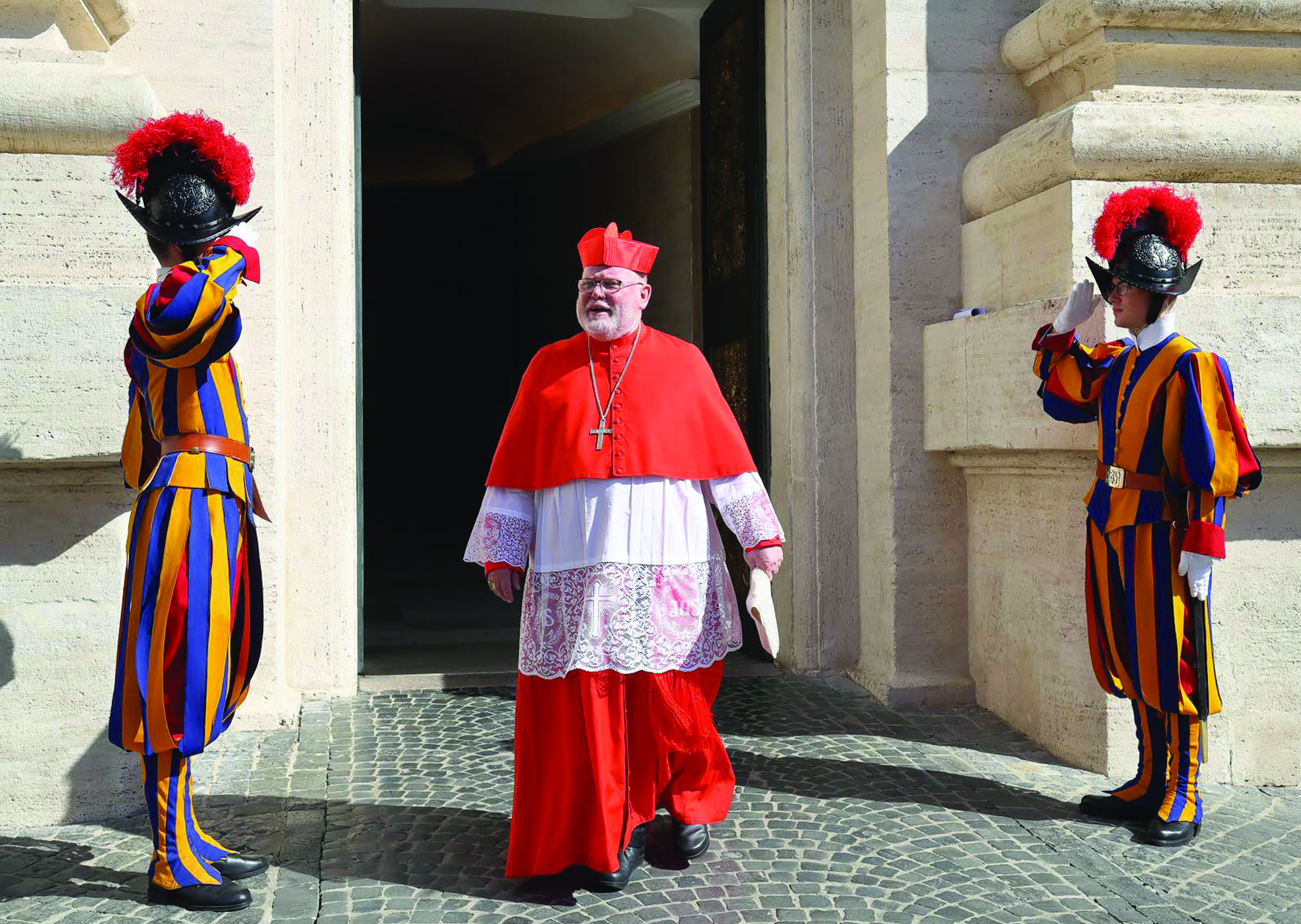 Why did Cardinal Marx wish to resign?
Why did Cardinal Marx wish to resign?
By Robert Moynihan, editor of Inside the Vatican
Cardinal Reinhard Marx is only 67, and so he was asking to leave his archbishop’s post some eight years before turning 75 — the ordinary retirement age for bishops.
Why did Marx feel it was necessary for him to resign? There have been no allegations of any wrongdoing by him, either in his actions or in his dealing with the actions of others. Why then would he not remain at his post to continue working at something he says is important to him: to ensure in so far as is in his power that sexual abuse does not occur, and, if it should occur, is not covered up by ecclesial authorities?
Marx has led the archdiocese of Munich-Freising for 14 years, since 2007.
His resignation request did not extend, evidently, to other important posts Marx holds in the Church.
For example, even if his resignation had been accepted by the Pope, Marx would still, it appears, continue to be a voting cardinal, and would still serve as one of the seven members of Francis’ special advisory “Council of Cardinals,” and would still be the coordinator of the Vatican’s “Council for the Economy,” which supervises the financial activities of both the Vatican City-State and the offices of the Holy See.
So why ask to leave his post as archbishop of Munich and Freising?
Marx is arguably the most prominent and influential of the German bishops. He was the President of the German bishops’ conference from 2012-20. In that role, he was a key organizer of the often controversial German “synodal path,” initiated by the German bishops as a way of answering public calls for a number of Church reforms.
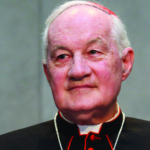 In 2019, Marx strongly defended the German Synodal program from criticism by Cardinal Marc Ouellet, head of the Vatican’s Congregation for Bishops.
In 2019, Marx strongly defended the German Synodal program from criticism by Cardinal Marc Ouellet, head of the Vatican’s Congregation for Bishops.
Ouellet had said some of the topics up for discussion in Germany — including, for example, the role of women in the ministries of the Church — might have an impact on the entire global Church.
This exchange led many observers to conclude that Rome — in the person of Ouellet — was concerned about the path the German bishops, led by Marx, were taking, fearing the possible emergence of a type of “national Church” within Catholicism.
The eventual emergence of a such a “German Catholic Church” as a kind of special subset of the “Roman Catholic Church” would risk harming the unity of the Church, and the universality of the Church, characterized by the adherence to one faith and one practice throughout the world by all members of the Church, Ouellet seemed to be arguing.
It is precisely this unity and universality which is the special duty of the Pope — and his advisors in Rome (his Roman Curia) — to preserve and protect. The Pope carries out this duty by “confirming his brothers in the faith” (see Luke 22:32, where Jesus says to Peter: “But I have prayed for thee, that thy faith fail not: and thou, being once converted, confirm thy brethren”).
Only once in his May 21 letter does Marx mention the German “synodal path,” but he refers to it, strikingly, as “the only way” out of the present crisis of the Church in Germany.
Doubling down on the Synodal Path?
There is something admirable on the surface about taking personal responsibility for the shortcomings of the Church with regard to the sexual abuse of so many victims.
Paraphrasing, Marx in his letter seems to be saying: “I accuse myself of going along with the Church and its terrible ways.”
If “the system” is the problem, and the “synodal path” is the solution, no light is shed on what seems a central issue which few wish to focus on: the failure in formation — the failure to form Christian believers in Christian virtue so that sexual abuse is less likely to be a temptation.
In this sense, it seems that Marx wished to step down from his post as archbishop to publicly emphasize his repentance for and break with a “system of coverup” which thought more about the image of the Church than about the suffering of victims.
Yet, at the same time, Marx wishes to “double down” on the “synodal path” he has helped to fashion, calling it the “one way” to bring about a true reform of the Church which will help protect victims.
It is this point that remains doubtful: is the “synodal path” really the right path for the Church to take to grow in virtue and holiness, including caring in the most profound way for victims of every type of abuse?
Or could such a path lead to a type of “theological abuse,” a type of embrace of worldly thinking which breaks with tents of the faith handed down for 2,000 years?
Indeed, could such a path leading toward disunity in the Church, geographical division (region by region, country by country) but also division over time (departing from unity with the Christians of the first century, the fourth, the 12th, the 19th, down through all the ages)?
That question remains still to answer, after reading Marx’s unexpected and unusual letter.
A biography of Cardinal Reinhard Marx
Born in Geseke, North Rhine-Westphalia, Germany, on September 21, 1953, Marx was ordained to the priesthood for the Archdiocese of Paderborn on June 2, 1979. He obtained a doctorate in theology from the University of Bochum in 1989.
On July 23, 1996, he was appointed Auxiliary Bishop of Paderborn and Titular Bishop of Petina by Pope John Paul II.
On December 20, 2001 he was named Bishop of Trier, the oldest diocese in Germany.
On November 30, 2007 Pope Benedict XVI appointed Marx metropolitan archbishop of Munich and Freising (a position that Benedict held from 1977 to 1981).
While Archbishop of Munich, in 2010 Marx was named by Pope Benedict as a member of the Congregation for Catholic Education for a five-year term, and appointed a member of the Pontifical Council for Justice and Peace.
In March, 2012, he was appointed a member of the Congregation for the Oriental Churches; the Commission of the Bishops’ Conferences of the European Community elected him its president.
He was one of the cardinal electors in the 2013 papal conclave that elected Pope Francis.
On April 13, 2013 he was appointed to Pope Francis’ Council of Cardinal Advisers, to advise him on revision of the Apostolic Constitution on the Roman Curia, Pastor Bonus.
On March 12, 2014 Marx was elected chairman of the German Bishops’ Conference, and served in this capacity until his replacement Georg Bätzing was elected on March 3, 2020.
On 15 October 2020, Pope Francis renewed Marx’s term on the Council of Cardinal Advisers.
Marx currently serves as head of the committee for social issues at the German Bishops’ Conference.
None of Cardinal Marx’s positions within the Vatican Curia would be affected by his resignation as the Archbishop of Munich and Freisburg.
Letter of Cardinal Marx to Pope Francis
21st May 2021
Holy Father,
Without doubt, these are times of crisis for the Church in Germany.
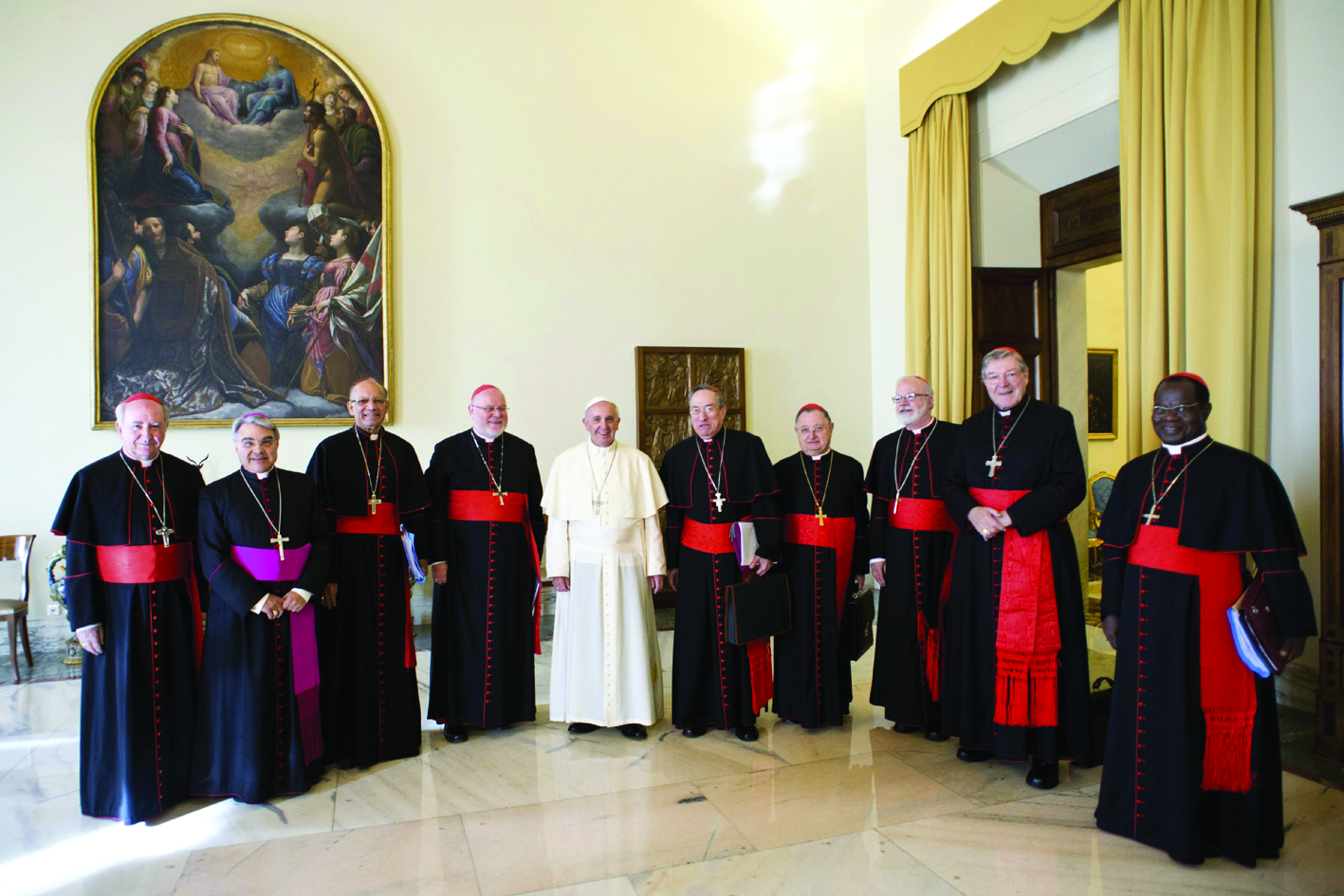
Vatican Oct. 1, 2013. Cardinal Marx with Pope Francis in a group of cardinals chosen by the Pope to help him reform the Roman Curia and study possible changes in the worldwide Church
“I therefore strongly request you to accept this resignation. I continue to enjoy being a priest and a bishop of this church and I will keep committing myself in pastoral matters, wherever you deem it reasonable and useful”
There are, of course, many reasons for this situation – also beyond Germany in the whole world – and I believe it is not necessary to state them in detail here. However, this crisis has also been caused by our own failure, by our own guilt. This has become clearer and clearer to me looking at the Catholic Church as a whole, not only today but also in the past decades. My impression is that we are at a “dead end” which, and this is my paschal hope, also has the potential of becoming a “turning point”. Of course, the “paschal faith” also applies to our pastoral care as bishops: For whoever wishes to save his life will lose it, but whoever loses his life will find it!
Since last year, I have thought about this more thoroughly and have asked myself what this means for me personally and I have decided – encouraged by the Easter period – to ask you to accept my resignation as Archbishop of Munich and Freising. In essence, it is important to me to share the responsibility for the catastrophe of the sexual abuse by Church officials over the past decades. The investigations and reports of the last ten years have consistently shown that there have been many personal failures and administrative mistakes but also institutional or “systemic” failure.
The recent debates have shown that some members of the Church refuse to believe that there is a shared responsibility in this respect and that the Church as an institution is hence also to be blamed for what has happened and therefore disapprove of discussing reforms and renewal in the context of the sexual abuse crisis. I firmly have a different opinion. Both aspects have to be considered: mistakes for which you are personally responsible and the institutional failure which requires changes and a reform of the Church.
A turning point out of this crisis is, in my opinion, only possible if we take a “synodal path”, a path which actually enables a “discernment of spirits” as you have repeatedly emphasised and reiterated in your letter to the Church in Germany.
I have been a priest for forty-two years and a bishop for almost twenty-five years, twenty years thereof I was an ordinary in large bishoprics. It is painful for me to witness the severe damage to the bishops‘ reputation in the ecclesiastical and secular perception which may even be at its lowest.
To assume responsibility, it is therefore not enough in my opinion to react only and exclusively if the files provide proof of the mistakes and failures of individuals. We as bishops have to make clear that we also represent the institution of the Church as a whole.
And it is also not right to simply link these problems largely on past times and former Church officials thereby „burying“ what happened. I feel that through remaining silent, neglecting to act and over-focusing on the reputation of the Church I have made myself personally guilty and responsible. Only after 2002 and even more since 2010, those affected by sexual abuse have been brought to the fore more consequently and this change of perspective has not yet been completed. Overlooking and disregarding the victims was certainly our greatest fault of the past. In the aftermath of the MHG survey commissioned by the German Bishops‘ Conference I stated in the Cathedral of Munich that we have failed. But who is this “We“? In fact, I also belong to this circle. And this means that I must also draw personal consequences from this.
This is becoming increasingly clear to me. I believe one possibility to express this willingness to take over responsibility is my resignation. In doing so, I may be able to send a personal signal for a new beginning, for a new awakening of the Church, not only in Germany. I would like to show that not the ministry is in the foreground but the mission of the Gospel. This too is an element of the pastoral care.
I therefore strongly request you to accept this resignation. I continue to enjoy being a priest and a bishop of this Church and I will keep committing myself in pastoral matters, wherever you deem it reasonable and useful. In the next years of my service, I would like to increasingly dedicate myself to pastoral care and support an ecclesiastical renewal of the Church which you also call for incessantly.
Oboedientia et Pax and oremus pro invicem
Your obedient Reinhard Cardinal Marx
Archbishop of Munich and Freising.
Pope Francis replies: “Tend my sheep”
On June 10, the Holy See Press Office published Pope Francis’ reply to Cardinal Marx. In it, the Pope agreed with the cardinal’s description of the abuse crisis in the Church, urging him to “continue as you propose, but as the Archbishop of Munich and Freising.” Francis, in echo of Cardinal Marx’s assessment, said that “the whole Church is in crisis because of the abuse issue,” and that “taking up the crisis, personally and communally, is the only fruitful way, because we do not come out of a crisis alone but in community.”
Is Francis signaling that he also wants the German cardinal to pursue the “Synodal Path” of which Marx is a passionate advocate?
By Vatican News
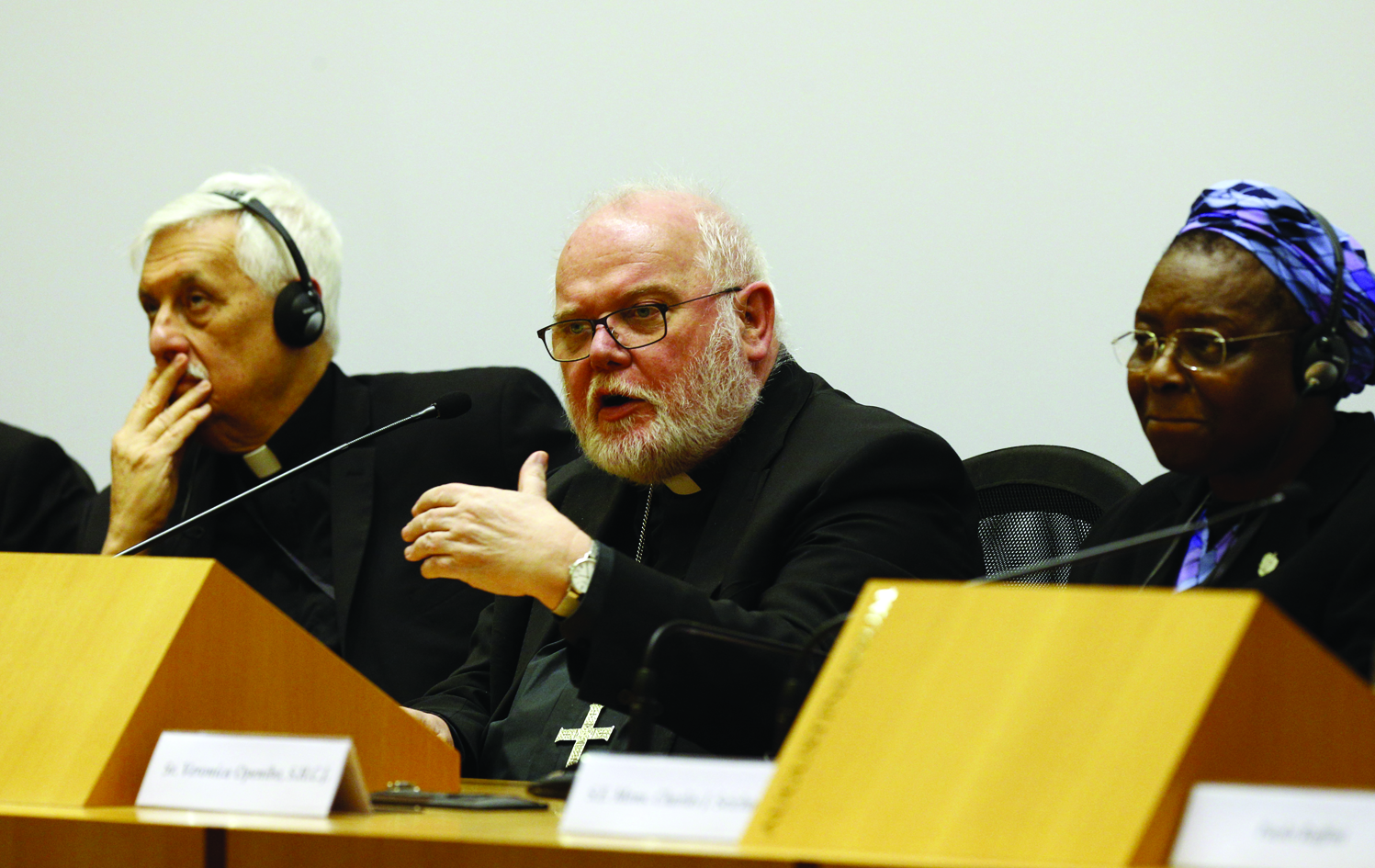
Cardinal Reinhard Marx of Munich speaks at a Vatican briefing during the meeting on the protection of minors in the Church, Feb. 23, 2019. Also pictured are Father Arturo Sosa Abascal, superior general of the Society of Jesus, and Nigerian Sister Veronica Openibo, congregational leader of the Society of the Holy Child Jesus. (CNS photo/Paul Haring)
“If you are tempted to think that by confirming your mission and not accepting your resignation, this Bishop of Rome (your brother who loves you) does not understand you, think of what Peter felt before the Lord when, in his own way, he presented his resignation,” by presenting himself as a sinner, and received the answer, “Shepherd my sheep.”
It is with this image that Pope Francis concludes his letter in which he rejects the resignation presented by Cardinal Reinhard Marx, Archbishop of Munich and Freising. It was written in Spanish and published in Spanish and German by the Holy See Press Office on June 10. In it, the Pope thanks Cardinal Marx for the “Christian courage that does not fear the cross, that does not fear being humiliated before the tremendous reality of sin.” Francis recalls that “the whole Church is in crisis because of the abuse issue,” maintaining that “the Church today cannot take a step forward without addressing this crisis” because “the politics of the ostrich leads nowhere, and the crisis must be addressed by our Paschal faith.” Therefore, he adds, “taking up the crisis, personally and communally, is the only fruitful way, because we do not come out of a crisis alone but in community.”
Pope Francis said it is “urgent” to allow “the Spirit to lead us to the desert of desolation, to the Cross and resurrection. It is the way of the Spirit that we must follow, and the starting point is the humble confession: We have erred, we have sinned.”
In doing so, the Pope explained, “we will feel that healing shame that opens the doors to the compassion and tenderness of the Lord who is always close to us.” Francis also said that he appreciates the ending of Marx’s letter and his willingness to continue “to be a priest and bishop of this Church,” committing himself to spiritual renewal.
“And this is my answer, dear brother,” the Pope concluded. “Continue as you propose, but as Archbishop of Munich and Freising. Recalling that the Bishop of Rome, Successor of that Peter who had said to Jesus, ‘Depart from me, for I am a sinner,’ can understand him well, and invites him to listen to the answer that the Nazarene gave to the Prince of the Apostles: “Tend my sheep.”
Stretching the bounds of Eucharistic reception
In 2018, Cardinal Marx and a majority of other German bishops supported a proposal to allow Protestant spouses of German Catholics to receive the Eucharist at Mass.
However, Rome’s Congregation for the Doctrine of the Faith warned in a September 2019 statement that the theologians’ proposal contained “doctrinal errors,” and said that intercommunion could not be left to “individual decisions of conscience.” The German proposal for “reciprocal eucharistic hospitality” was tabled in September 2019 by a working group of Protestant and Catholic theologians.
“I would like to see Christians celebrate the Eucharist together, without becoming a unified Church,” the Cardinal nevertheless told the Munich-based Bayern Radio in October 2020. “Ecumenism only works if we try to understand the position of others and sometimes accept differences.”
In 2015, Cardinal Marx strenuously advocated that the Church reconsider its universal ban on allowing the divorced and civilly-remarried to receive the Eucharist.
“With a view to divorced and remarried Catholics who take an active part in parish life, many faithful ask why the church without exception refuses to let them partake of Communion,” Marx said in remarks at the October 2015 Synod on the Family. “They cannot understand how one can belong to the full community of the church and yet be excluded from the sacraments of reconciliation and the Eucharist. The reason given is that divorced and remarried people are in an objectively adulterous situation and therefore contradict what the Eucharist symbolically represents, namely Christ’s loyalty to His church.
“But does this explanation do justice to the situation of those concerned?” Marx continued. “ And is it mandatory from the sacramental-theological point of view? Can people who are seen to be in a state of grave sin really have the feeling of fully belonging to us?”

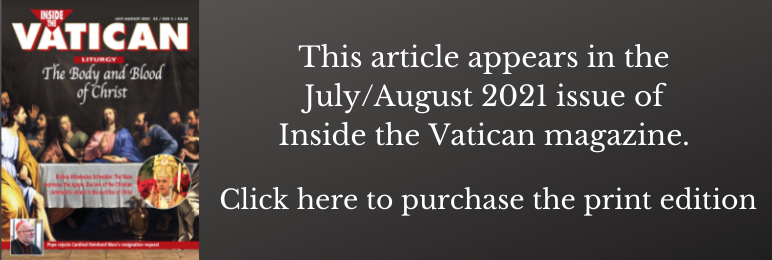
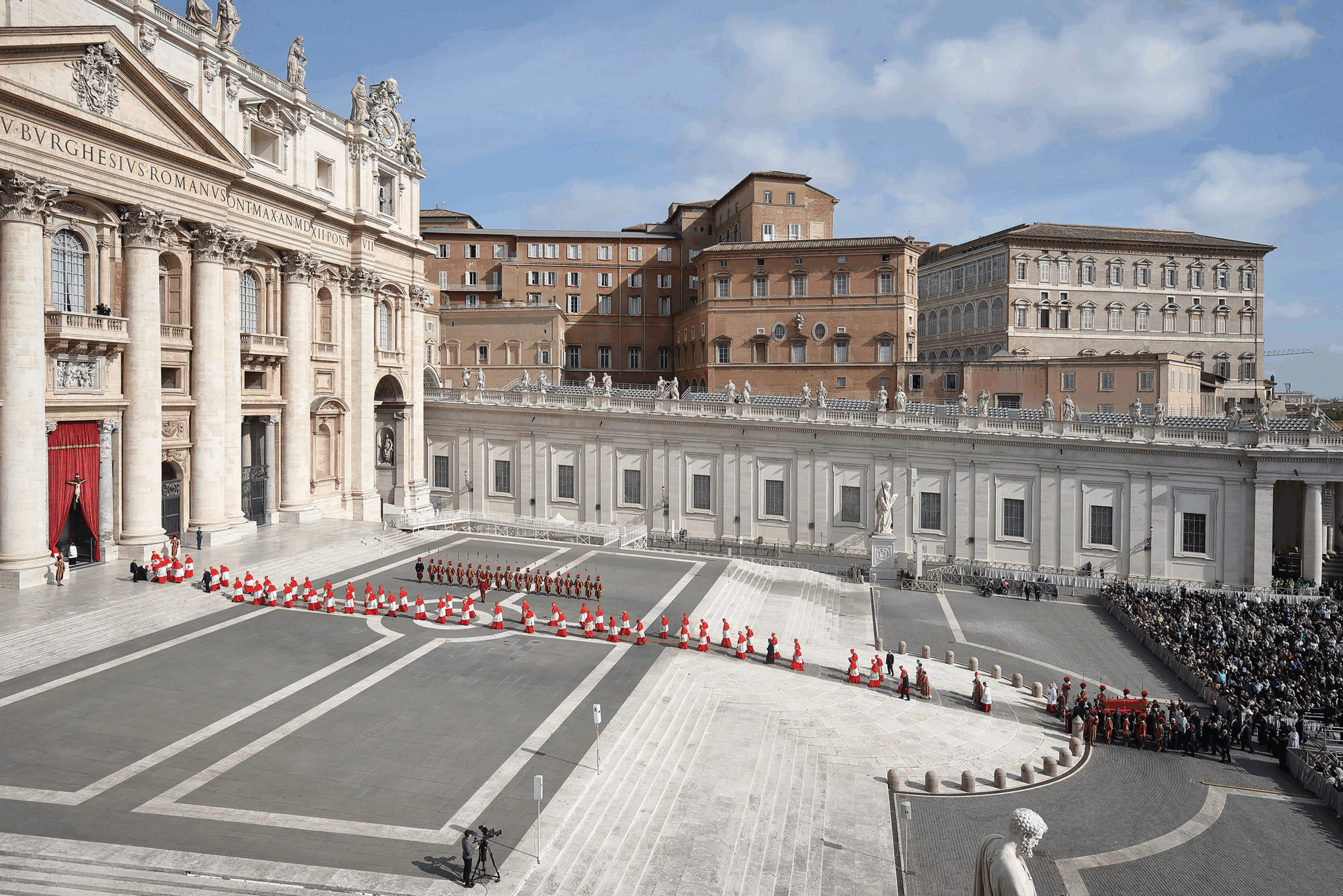




Facebook Comments